『武士道 Bushido 』-新渡戸稲造(Inazo Nitobé)-
Chapter 06
(Politeness 「礼」人とともに喜び人とともに泣けるか )
Bushido, the Soul of Japan by Inazo Nitobe
[Book]
[reading]
・Chapter TOP 新渡戸稲造(Inazo Nitobé)TOP
・Chapter 00(Prefaces 序文)
・Chapter 01(Bushido as an Ethical System 武士道とは)
・Chapter 02(Sources of Bushido 武士道の源)
・Chapter 03(Rectitude or Justice 「義」)
・Chapter 04(Courage, the Spirit of Daring and Bearing 「勇」)
・Chapter 05(Benevolence, the Feeling of Distress 「仁」)
・Chapter 06(Politeness 「礼」)
・Chapter 07(Veracity or Truthfulness 「誠」)
・Chapter 08(Honor 「名誉」)
・Chapter 09(The Duty of Loyalty 「忠義」)
・Chapter 10(Education and Training of a Samurai 武士は何を学びどう己を磨いたか)
・Chapter 11(Self-Control 人に勝ち己に勝つために)
・Chapter 12(The Institutions of Suicide and Redress 「切腹」)
・Chapter 13(The Sword, the Soul of the Samurai 「刀」)
・Chapter 14(The Training and Position of Woman 武士道が求めた女性の理想像)
・Chapter 15(The Influence of Bushido 「大和魂」)
・Chapter 16(Is Bushido Still Alive? 武士道は蘇るか)
・Chapter 17(The Future of Bushido 武士道から何を学ぶか)
・[修養]、
・[自警録]
that courtesy and urbanity of manners which has been noticed by every foreign tourist as a marked Japanese trait. Politeness is a poor virtue, if it is actuated only by a fear of offending good taste, whereas it should be the outward manifestation of a sympathetic regard for the feelings of others. It also implies a due regard for the fitness of things, therefore due respect to social positions; for these latter express no plutocratic distinctions, but were originally distinctions for actual merit.
In its highest form, politeness almost approaches love. We may reverently say, politeness "suffereth long, and is kind; envieth not, vaunteth not itself, is not puffed up; doth not behave itself unseemly, seeketh not her own, is not easily provoked, taketh not account of evil." Is it any wonder that Professor Dean, in speaking of the six elements of Humanity, accords to Politeness an exalted position, inasmuch as it is the ripest fruit of social intercourse?
While thus extolling Politeness, far be it from me to put it in the front rank of virtues. If we analyze it, we shall find it correlated with other virtues of a higher order; for what virtue stands alone? While—or rather because—it was exalted as peculiar to the profession of arms, and as such esteemed in a degree higher than its deserts, there came into existence its counterfeits. Confucius himself has repeatedly taught that external appurtenances are as little a part of propriety as sounds are of music.
When propriety was elevated to the sine qua non of social intercourse, it was only to be expected that an elaborate system of etiquette should come into vogue to train youth in correct social behavior. How one must bow in accosting others, how he must walk and sit, were taught and learned with utmost care. Table manners grew to be a science. Tea serving and drinking were raised to a ceremony. A man of education is, of course, expected to be master of all these. Very fitly does Mr. Veblen, in his interesting book,[11] call decorum "a product and an exponent of the leisure-class life."
Theory of the Leisure Class, N.Y. 1899, p. 46.
I have heard slighting remarks made by Europeans upon our elaborate discipline of politeness. It has been criticized as absorbing too much of our thought and in so far a folly to observe strict obedience to it. I admit that there may be unnecessary niceties in ceremonious etiquette, but whether it partakes as much of folly as the adherence to ever-changing fashions of the West, is a question not very clear to my mind. Even fashions I do not consider solely as freaks of vanity; on the contrary, I look upon these as a ceaseless search of the human mind for the beautiful. Much less do I consider elaborate ceremony as altogether trivial; for it denotes the result of long observation as to the most appropriate method of achieving a certain result. If there is anything to do, there is certainly a best way to do it, and the best way is both the most economical and the most graceful. Mr. Spencer defines grace as the most economical manner of motion. The tea ceremony presents certain definite ways of manipulating a bowl, a spoon, a napkin, etc. To a novice it looks tedious. But one soon discovers that the way prescribed is, after all, the most saving of time and labor; in other words, the most economical use of force,—hence, according to Spencer's dictum, the most graceful.
The spiritual significance of social decorum,—or, I might say, to borrow from the vocabulary of the "Philosophy of Clothes," the spiritual discipline of which etiquette and ceremony are mere outward garments,—is out of all proportion to what their appearance warrants us in believing. I might follow the example of Mr. Spencer and trace in our ceremonial institutions their origins and the moral motives that gave rise to them; but that is not what I shall endeavor to do in this book. It is the moral training involved in strict observance of propriety, that I wish to emphasize.
I have said that etiquette was elaborated into the finest niceties, so much so that different schools advocating different systems, came into existence. But they all united in the ultimate essential, and this was put by a great exponent of the best known school of etiquette, the Ogasawara, in the following terms: "The end of all etiquette is to so cultivate your mind that even when you are quietly seated, not the roughest ruffian can dare make onset on your person." It means, in other words, that by constant exercise in correct manners, one brings all the parts and faculties of his body into perfect order and into such harmony with itself and its environment as to express the mastery of spirit over the flesh. What a new and deep significance the French word biensèance comes thus to contain!
Etymologically well-seatedness.
If the premise is true that gracefulness means economy of force, then it follows as a logical sequence that a constant practice of graceful deportment must bring with it a reserve and storage of force. Fine manners, therefore, mean power in repose. When the barbarian Gauls, during the sack of Rome, burst into the assembled Senate and dared pull the beards of the venerable Fathers, we think the old gentlemen were to blame, inasmuch as they lacked dignity and strength of manners. Is lofty spiritual attainment really possible through etiquette? Why not?—All roads lead to Rome!
As an example of how the simplest thing can be made into an art and then become spiritual culture, I may take Cha-no-yu, the tea ceremony. Tea-sipping as a fine art! Why should it not be? In the children drawing pictures on the sand, or in the savage carving on a rock, was the promise of a Raphael or a Michael Angelo. How much more is the drinking of a beverage, which began with the transcendental contemplation of a Hindoo anchorite, entitled to develop into a handmaid of Religion and Morality? That calmness of mind, that serenity of temper, that composure and quietness of demeanor, which are the first essentials of Cha-no-yu are without doubt the first conditions of right thinking and right feeling. The scrupulous cleanliness of the little room, shut off from sight and sound of the madding crowd, is in itself conducive to direct one's thoughts from the world. The bare interior does not engross one's attention like the innumerable pictures and bric-a-brac of a Western parlor; the presence of kakemono calls our attention more to grace of design than to beauty of color. The utmost refinement of taste is the object aimed at; whereas anything like display is banished with religious horror. The very fact that it was invented by a contemplative recluse, in a time when wars and the rumors of wars were incessant, is well calculated to show that this institution was more than a pastime. Before entering the quiet precincts of the tea-room, the company assembling to partake of the ceremony laid aside, together with their swords, the ferocity of the battle-field or the cares of government, there to find peace and friendship.
Hanging scrolls, which may be either paintings or ideograms, used for decorative purposes.
Cha-no-yu is more than a ceremony—it is a fine art; it is poetry, with articulate gestures for rhythm: it is a modus operandi of soul discipline. Its greatest value lies in this last phase. Not infrequently the other phases preponderated in the mind of its votaries, but that does not prove that its essence was not of a spiritual nature.
Politeness will be a great acquisition, if it does no more than impart grace to manners; but its function does not stop here. For propriety, springing as it does from motives of benevolence and modesty, and actuated by tender feelings toward the sensibilities of others, is ever a graceful expression of sympathy. Its requirement is that we should weep with those that weep and rejoice with those that rejoice. Such didactic requirement, when reduced into small every-day details of life, expresses itself in little acts scarcely noticeable, or, if noticed, is, as one missionary lady of twenty years' residence once said to me, "awfully funny." You are out in the hot glaring sun with no shade over you; a Japanese acquaintance passes by; you accost him, and instantly his hat is off—well, that is perfectly natural, but the "awfully funny" performance is, that all the while he talks with you his parasol is down and he stands in the glaring sun also. How foolish!—Yes, exactly so, provided the motive were less than this: "You are in the sun; I sympathize with you; I would willingly take you under my parasol if it were large enough, or if we were familiarly acquainted; as I cannot shade you, I will share your discomforts." Little acts of this kind, equally or more amusing, are not mere gestures or conventionalities. They are the "bodying forth" of thoughtful feelings for the comfort of others.
Another "awfully funny" custom is dictated by our canons of Politeness; but many superficial writers on Japan, have dismissed it by simply attributing it to the general topsy-turvyness of the nation. Every foreigner who has observed it will confess the awkwardness he felt in making proper reply upon the occasion. In America, when you make a gift, you sing its praises to the recipient; in Japan we depreciate or slander it. The underlying idea with you is, "This is a nice gift: if it were not nice I would not dare give it to you; for it will be an insult to give you anything but what is nice." In contrast to this, our logic runs: "You are a nice person, and no gift is nice enough for you. You will not accept anything I can lay at your feet except as a token of my good will; so accept this, not for its intrinsic value, but as a token. It will be an insult to your worth to call the best gift good enough for you." Place the two ideas side by side; and we see that the ultimate idea is one and the same. Neither is "awfully funny." The American speaks of the material which makes the gift; the Japanese speaks of the spirit which prompts the gift.
It is perverse reasoning to conclude, because our sense of propriety shows itself in all the smallest ramifications of our deportment, to take the least important of them and uphold it as the type, and pass judgment upon the principle itself. Which is more important, to eat or to observe rules of propriety about eating? A Chinese sage answers, "If you take a case where the eating is all-important, and the observing the rules of propriety is of little importance, and compare them together, why merely say that the eating is of the more importance?" "Metal is heavier than feathers," but does that saying have reference to a single clasp of metal and a wagon-load of feathers? Take a piece of wood a foot thick and raise it above the pinnacle of a temple, none would call it taller than the temple. To the question, "Which is the more important, to tell the truth or to be polite?" the Japanese are said to give an answer diametrically opposite to what the American will say,—but I forbear any comment until I come to speak of
Read文献、
book文献
TOP
日本の魂ー日本思想の解明ー
日本的思考の根源を見る。
”忠義”は追従ではない。”名誉”は求める心である。
(第三章 義-あるいは正義について)
サムライにとって、 卑怯な行動や不正な行動ほど恥ずべきものはない。
(第九章 忠義)
武士道は、われわれの良心を主君の奴隷となすべきことを要求しなかった
(第十章 武士の教育)
武士道は経済とは正反対のものである。それは貧しさを誇る。
(第十一章 克己)
心の奥底の思いや感情—特に宗教的なもの—を雄弁に述べ立てることは、日本人の間では、それは深遠でもなく、 誠実でもないことの疑いないしるしだと受け取られた。
(第十四章 女性の教育と地位)
妻がその夫、家庭そして家族のために身を捨てることは、男が主君と国のために身を捨てるのと同様、自発的かつみごとになされた。
|
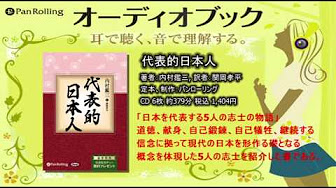
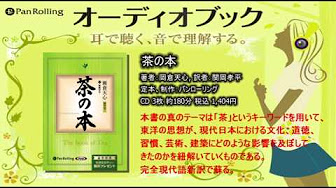
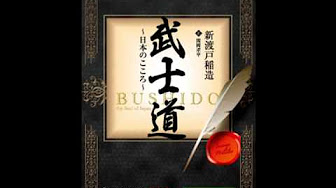


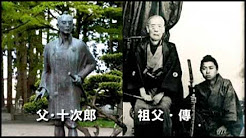

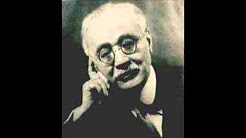



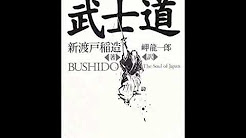
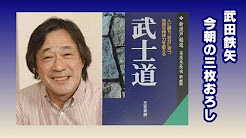
・新渡戸稲造
第1弾「世界を結ぶ『志』~新渡戸稲造の生涯~」、
第2弾「未来につながる『道』~新渡戸稲造の武士道~」、
第3弾「すべてに根ざす『愛』~新渡戸稲造の苦悩~」、
・ 新渡戸稲造の至極の名言集
・「新渡戸稲造の名言」20話
| |
・Bushido: The Soul of Japan by Inazo Nito(1-18)
・Bushido: The Soul of Japan by Inazo Nitobe(1-18)
・武士道「BUSHIDO」Japanese Ver.
・≪AI朗読≫武士道
・【武田鉄矢】『武士道』完全版
|
Bushido, the Soul of Japan
『武士道は定式化されたものではないが、昔もそして今も、日本人を鼓舞し、わが国を動かす原動力なのである』
日本人が日本人たりえる所以。
国家としての歴史的哲学体系を持たない日本の、現代社会においても尚、我々の血肉となり、在り続ける道徳律の根幹は「武士道」にあり。
日本人 新渡戸稲造博士が世界に発信した日本人論。
世代と国境を越え今なお読み継がれている世界的ベストセラー。
西洋・東洋の文化・哲学・思想と照らし合わせながら、その特異性と唯一無二の行動規範・心の拠り所を詳細に解説した普遍の書が、完全現代語訳、プロフェッショナルのナレーションで今蘇る。
21世紀。世界第三位の経済大国であるわが国日本。
政治的にも文化的にもより身近に世界と対峙する現代においてこそ、われわれの心の中に脈々と流れ続ける、日本人が日本人足らしめる「武士道」の精神を紐解く時なのではないだろうか。
本書は1世紀の時を超えた今も尚色褪せること無く、むしろその博識と見解、交える事例とそのユーモアに溢れた表現により現代人の我々にも実に痛快に日本の心「武士道」を理解させてくれる。
「武士道」がいつどのようにして始まったのか、それはどんな特徴を持ち、どのようなことを教えようとしているのか、武士以外の一般民衆にどのような影響を与えたのか、その影響がどれほど永く続いているか。
様々な角度・キーワードで武士の心得、さむらいの心の在り方をリレー形式で綴っている。
世界有数の犯罪率の低さ、大災害時での規律、自発的な他助の精神と行動は時代を超えて、親から子へと語り継がれてきた「道徳律」が存在し続けていることを如実に表している。
知っているようで知らない「日本の心」が、ここに明かされている。
内容抜粋
「今何とおっしゃいましたか?」と敬愛する教授は尋ねた。
「日本の学校には宗教の教育がないということでしょうか?」
そうですと答えると、教授は驚いて足を止めた。そして、今でも耳から離れない声音で、重ねてこう聞いた。
「宗教がない! だとしたら、いったいどうやって道徳を教えるんですか?」
この質問に私は意表を突かれ、とっさに答えを返すことができなかった。というのも、子どもの頃私が学んだ道徳というのは、学校で教わったものではなかったからである。私は、自分の持っている善悪正邪の概念を作り上げているさまざまな要素をひとつひとつ分析してみて、ようやく、それらを私の中に植えつけたのは「武士道」であったことに気づいた。
武士道とは、武士が守るよう求められる、もしくは、そう教えられる道徳的な作法である。文字に書かれたものはなく、せいぜい口伝えで伝えられた格言や、有名な武士や学者が書いたものが残されている程度である。
多くの場合そうしたものさえなく、しかしだからこそかえって深く心に刻まれ、守るべき掟<<おきて>>として強い拘束力を持っていた。ひとりの優秀な頭脳が考え出したものでもなければ、ひとりの高名な人物の生きかたが手本となってできたものでもない。数十年、数百年に及ぶ武士の歴史の中で自然に醸成されたものである。
「義は、道理に従ってためらうことなく、何をなすべきかを決断する力である。死ぬべきときは死を選び、討つべきときには討つことを選ぶ力である」
「戦いの真っただ中に飛び込んで討ち死にするのはいともたやすいことで、身分の卑しい者にもできる。生きるべきときは生き、死ぬべきときにのみ死ぬのが本当の勇気である」
「義に過ぎれば固くなる。仁に過ぎれば弱くなる」
「礼法の要点は精神を養うことにある。礼をもって静かに座っていれば、どんな乱暴者でも危害を加える気になれないほどに」
仁愛や謙譲の精神から生まれた礼儀は、他人に対する思いやりから生まれて、人への同情心を品よく優雅に表現するものだからである。
「心だに誠の道にかないなば祈らずとても神や守らん」
「忠ならんと欲すれば孝ならず、孝ならんと欲すれば忠ならず」
命は主君に仕えるための手段だと考えらえており、その理想形は、名誉のために命を捨てることであった。
「おのれの魂という畑が、優しい心で揺れ動くのを感ずるか? まかれた種が芽吹こうとしているのだ。言葉でそれを妨げてはならぬ。静かに、ひそやかに、自ら芽吹くのを見守っているのだ」
「死を軽<<かろ>>んずることは勇気のいる行為である。しかし、生きることが死よりもつらいときに、あえて生きることこそが本物の勇気である」
「かくすればかくなるものと知りながら やむにやまれぬ大和魂」
目次
訳者序文
初版への序文
改訂第10版への序文
新渡戸博士の『武士道』に寄せて
第1章 道徳体系としての「武士道」
第2章 武士道の源
第3章 「義」――あるいは正義について
第4章 「勇」――勇敢さと忍耐力
第5章 「仁」――慈愛の心
第6章 「礼」
第7章 「誠」――正直さと誠実さ
第8章 「誉<<ほまれ>>」――あるいは名誉について
第9章 「忠義」
第10章 武士の教育と鍛錬
第11章 自制心
第12章 切腹と敵討ちという制度
第13章 刀――武士の魂
第14章 女性の教育と地位
第15章 武士道から大和魂へ
第16章 武士道は今も生きているか
第17章 武士道のこれから
新渡戸稲造(Inazo Nitobe)
文久2年(1862年)、藩士 新渡戸十次郎の三男として南部藩(今の岩手県)に生まれる。
幼少期より東京英語学校に学び、少年期は、後に「代表的日本人」の著者でもある内村鑑三らとともに札幌農学校へ入学し学業を磨いた。
明治維新後はアメリカ・ドイツに渡り農政学を始め様々な研究に従事。
台湾総督府技師として台湾の殖産に携わり功績を挙げる。
国際連盟事務次長としても国際的に活躍。帰国後は様々な学校の教職を歴任した後、東京女子大学初代学長にもなる。
本書「武士道」は英語のみならずポーランド、ドイツ、ノルウェー、スペイン、ロシア、イタリアなど、主として欧米の多様な国の言語に翻訳され世界的ベストセラーとなる。旧五千円札の肖像画の人物としても有名。
TOP

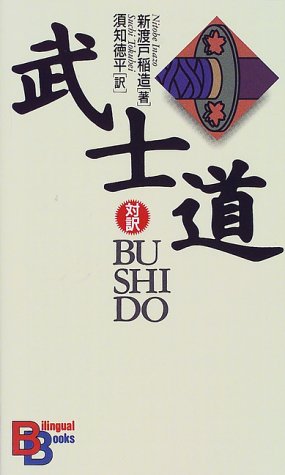

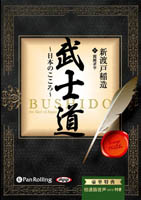 朗読,Read 朗読,Read
|
















 朗読,Read
朗読,Read
















 朗読,Read
朗読,Read